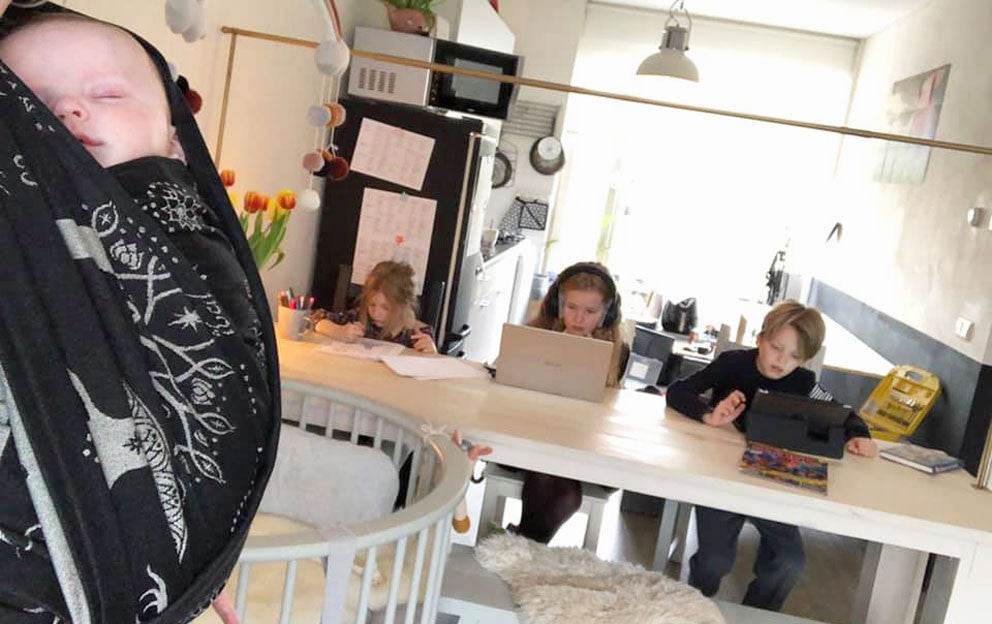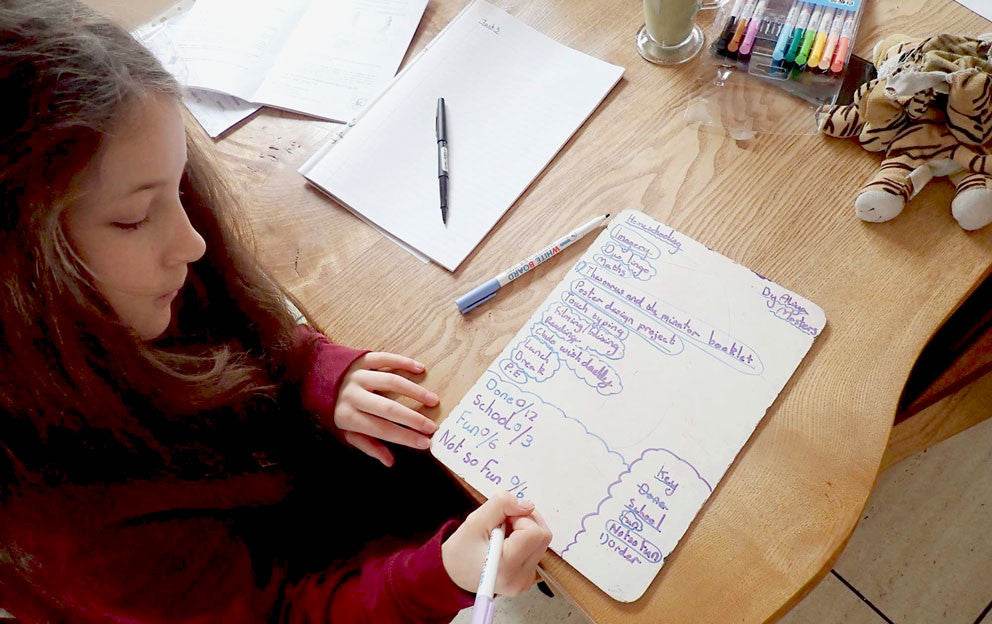Keep things simple and keep yourself relaxed!
There can be a lot of worry around homeschooling - are they doing enough/keeping up? Am I spending enough time with them? Do I really have the skills for this?! Here are our top tips to guide you through this time and help put your mind at ease.
1: Relax - put your oxygen mask on first
Remember that your moods and emotions have a real impact on your child. Studies have shown again and again that humans don't learn well, if at all, when they're in a stressed state.
So even though there's a lot going on and you may be concerned with their education, the best thing you can do for your children is actually to take the time to make sure your own needs are met as much as possible in order to be calm and loving with them.
So look after yourself and take some time each day to do something you find relaxing. For instance, a hot bath with your favourite essential oils, an hour (even 30 minutes) cosied up in bed reading or 10 minutes of mindfulness/meditation.
Also, remember that the expectations from schools are realistically low regarding what will be achieved and just getting the opportunity to spend time with you is going to be so nourishing for your children.

2: Let them Play!
We have all heard it, yet we don't seem to quite believe it, but children really do learn through play.
The formal education set up and structure has actually been shown to be quite ineffective for learning! OK, we all want to ensure our kids can read, write and do arithmetic, but there's still loads of time to allow their brains and bodies to develop through unstructured play.
That means you can allow time each day to let them explore their imagination without any input for you at all. Just keep them away from screens during this time and see if there are any resources you can help them with.
You could join in if they'd like it, or even just observe and chat with them about what they're doing for some of their play time (many kids love that), and you could also use this time to get on with your own tasks.
3: Use Online Learning Games and Apps
There are so many great resources out there now, many of which are free. As long as you limit screen time at other times during the day, why not use them?
Most of these resources are set up to look like games (like Sumdog), sometimes this can put parents off - most of us were taught in quite dry, formal ways and so we think that learning has to be somewhat painful!
Actually these games can really work and our kids experience them as fun. In many of them, they can set up groups with their friends and work through tasks together too, so they get to socialise and learn at the same time.
Here are a few of our favourites:
Duolingo - to learn languages
Typing Club - for touch typing
Sumdog - Mathematics and literacy
4: Teach Key Life Skills - find the learning opportunities in the everyday
Let's face it, much of what we learned in school hasn't proved to be that helpful! Good education doesn't have to be abstract, it can be incredibly practical.
Especially as you're at home, instead of taking the time to dream up lesson plans about the Russian Revolution, why not use the opportunity to let your children assist with your tasks? This is a great opportunity to help them develop a sense of responsibility and pride too, as well as learning the important things that will take them through their lives - cooking, cleaning, laundry, gardening and DIY.
The truth is that these skills can also become future careers, in case you needed more incentive to bake a batch of cookies together ;)

The key to encouraging them to engage with these kinds of tasks (and all learning really) is to try to make it fun and engaging, rather than a chore.
Give them a chance to do small parts of the task, rather than burdening them with too much all at once. Think about the way you talk to your child about it as your attitude will affect their response - tell them why what you're doing is important, how it helps the household and how it improves everyone's lives. For instance, tidying a room means you can find everything more easily and it gives everyone who comes into the space a sense of peace - it actually improves your emotional state!
5: Let Them Choose Topics
This is really important, it helps make learning fun for your child, and guess what - it actually lets you off the hook from having to plan everything!
When you start each day, or at the beginning of each week, discuss what they might like to do. Before you brush off their ideas, think about how what they've suggested could be an educational moment. Maybe you'd want to expand it somehow so you feel happier about it, but nearly all of the time you'll be able to see that their, sometimes random, choices actually have one subject or another embedded in them.
For instance, my kids like to do stick men drawings on the whiteboard - well there's fine motor skills, art, creativity and storytelling right there! My daughter loves making and editing videos and can now use iMovie really well - in the digital age, this is surely an amazing skill to have at such a young age.

6: Use Online Searches & Videos - you don't have to be the expert!
Sometimes people have it in their heads that, as home educators, they have to know everything they want their kids to learn about, and deliver lectures on these topics.
Actually it can be really healthy, as well as educational, to show your kids that you don't know everything! You can then show them a core skill for their future lives (in academia and beyond) - how to research! Show them the sort of keywords you would use and how to navigate to age appropriate sites (for instance, check out which 'key stage' your child is at and then type in 'KS1/2/3' in front of your search).
I love using YouTube videos as a starting point for anything they're interested in. The other day they were begging for us to get a fox as a pet so we firstly looked up the life of foxes and learned about their habits, then we searched 'do foxes make good pets' (the answer is no by the way!) - they took notes and made up some drawings afterwards.

7: Spot the Gaps
Instead of being a slave to the curriculum, keep it easy and think of what areas will be useful to develop for later life or any skills you have noticed your child is lagging in. For instance, I noticed my son's handwriting needed work, it hadn't really been picked up on at school and he wasn't even holding a pencil correctly so I bought some handwriting workbooks and he spends 10 minutes doing one or two every day.
I also noticed my kids sometimes have trouble processing emotions so we did some drama workshops on emotional intelligence and non-violent communication - to me this seems like a core skill for life.

8: Use One Thing to Develop a Whole Range of Learning From - there's no need to plan!
This is quite a fun and relatively easy way to spend a few learning hours and it saves you having to plan things out ahead of time. Just pick one topic or activity and then see how many different subjects you can develop from it!
Sometimes I'll start the day by sending the kids into the garden - they have to find 3 objects, which I might give them parameters for (e.g. something new, something red and something heavy) - they run around trying to find them for a bit of exercise, then sit down and write a story involving the 3 objects. They may then take turns reading out their story, practising presentation skills, I check the story for spelling and they then practice spelling on those words. We might then make a play from one of the stories which they plan and act out or draw pictures of their objects.
9: Avoid the Battles
There might be some things that your kids really hate doing but you think are very important and you're sick of having to battle it out to get them to do it, which can be so tiring and frustrating. First, really consider if it is that important - what stage are they at, what sort of impact will it really have if you drop it?
If you still think it's needed consider some ways you can make it fun - turn it into something creative, make a play about it, and, especially if your kid loves to move about a lot (perhaps they are a kinetic learner) try a physical game. For instance, try playing 'Around the World' - where you start off in different areas try to get each other out of the game by touching another person. You take turns to ask each other maths questions, if someone gets their question right then they can take a step. This means your child has to both answer your questions and also think up their own and know the answer to that too! Another option is to use an online resource/game as described above.
A final tip on this is to really reduce the amount of time spent on these 'tougher' tasks, even 10-15 minutes done regularly has a big impact. Let them set a timer and be in charge of themselves - it gives them a sense of responsibility and it means you don't have to monitor them.

10: Throw it All Out the Window and Go with the Flow
So you've planned out your day, you have the key areas you want to cover and all your resources lined up. Your little one starts their first task and becomes utterly absorbed in it, they start to have other ideas around it or just want to keep going with it but it's time to move on to the next task.
This is actually a pivotal moment - you've got them right where you want them - loving learning! Embodying it, absorbing it and in that cherished state that's meant to be so good for learning and creativity - 'flow'. So what do you do? One option is to allow this to be, maybe sit with them and see how you can develop things, or just leave them to it and either rearrange the task list or drop the whole lot depending on how they get on.
There's also the chance that you all wake up and have a totally new idea or something new comes up through the day - if they're inspired and you can, drop the task list and go with it! These little moments let them feel in control of their learning, it gives them a love of learning as they have the freedom of being able to follow their own interests and all of the enthusiasm and satisfaction that comes with that.

We'd love to hear your experiences of homeschooling, whether this is brand new to you or you're a seasoned pro! Join our community of parents, Clan Oscha, to share your stories and learn from others.
Read more in this blog series:
Homeschooling: Adjusting to Becoming a Home Educator and How to Keep it Simple
Keeping Homeschooling Easy - How to teach numeracy
Keeping Homeschooling Easy - How to teach Literacy
Keeping Homeschooling Easy - How to teach Physical Education













 https://oschaslings.com
https://oschaslings.com